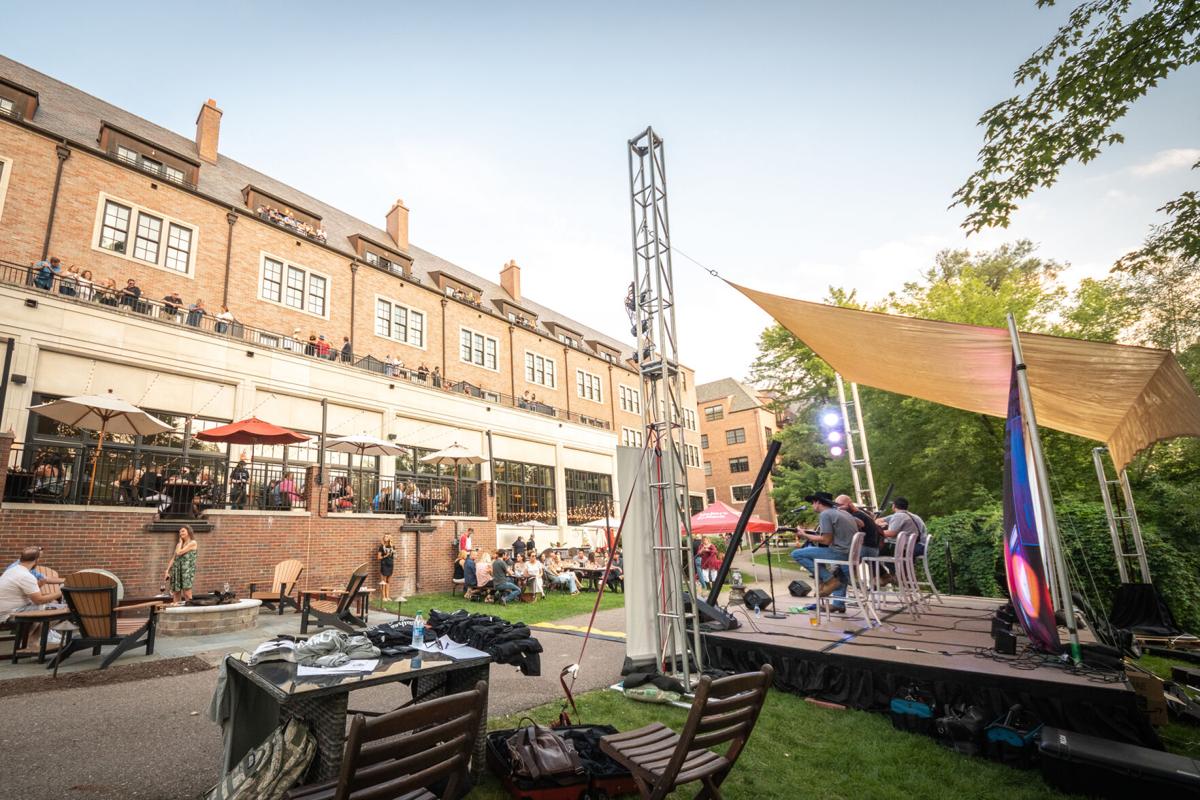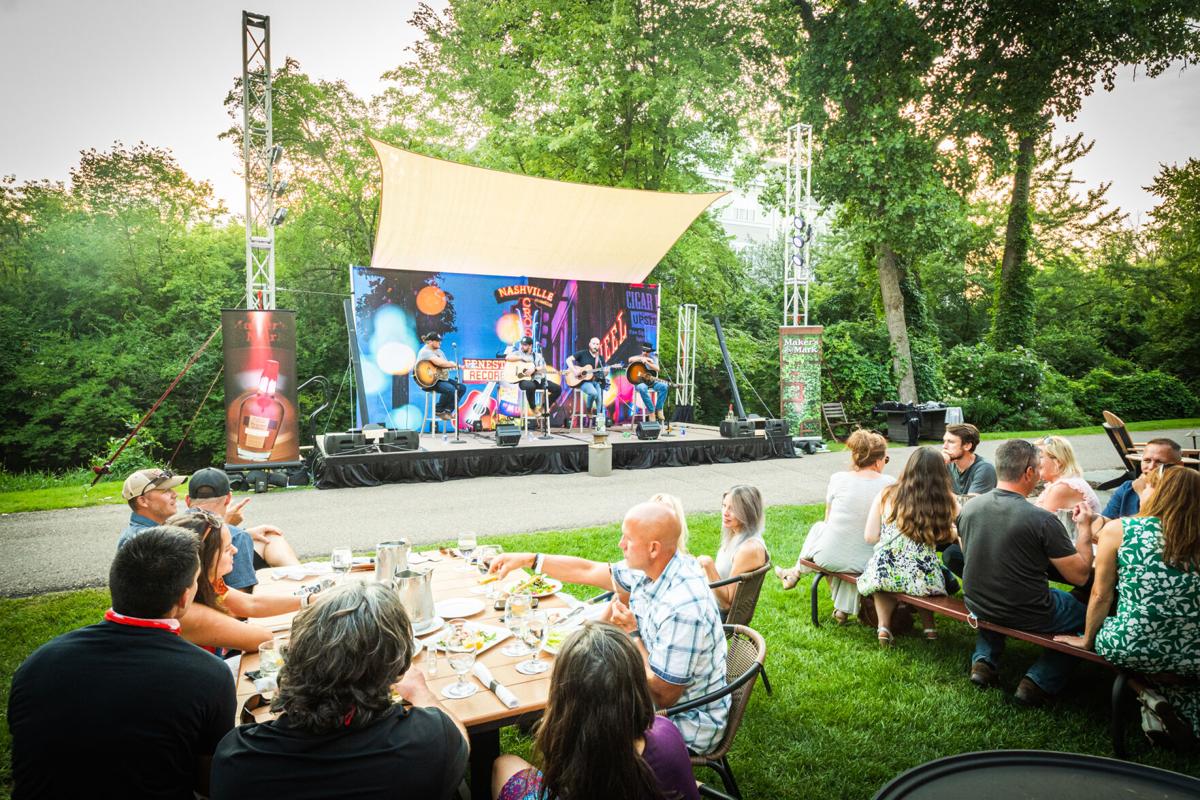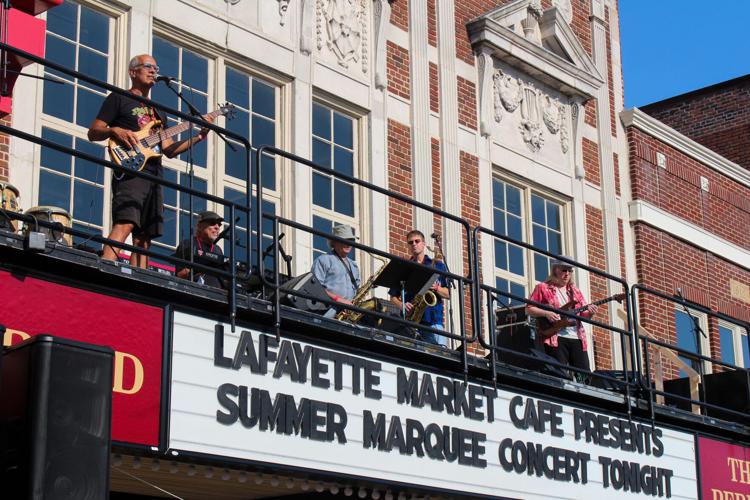If You Miss Concerts, This Article Is For You
With conventional live shows off the table for what looks like it’s going to be awhile, many artists are finding themselves in the position of either finding smart, creative ways to adapt to this new reality, or leave the music industry altogether. Here, we explore some of the ways musicians are successfully innovating in the live music sector.
Guest post by Fred Jacobs of Jacobs Media Strategies
Six months into COVID-19, and many people are questioning their career path. For musicians in the UK, it’s a majority.
A story in Digital Music News reports on an Encore Musicians survey that shows a whopping 64% of artists say they’re thinking about “leaving the music profession.”

It gets worse. Four in ten says they have absolutely no gigs booked through the end of the year. Zero, zip, nada.
To survive in the music biz in 2020, you need to be smart, creative, or Dave Grohl. Since not everyone can be the latter, novel approaches to performance are the focus of today’s guest post, featuring music afficianado, author, and Motor City bon vivant Gary Graff.
Gary currently writes for the Media News Group here in Michigan, the Cleveland Plain Dealer, as well as Billboard and United Stations Radio Network. He’s also been the music critic and know-it-all on the “Bob & Brian Show” on The Hog in Milwaukee.
Gary’s been searching for creative adaptation himself. In a “normal” Detroit summer, he averages five shows a week – minimum. These days, you have to dig a little deeper and search a little harder for music to see.
Gary did some investigating reporting, and wrote this story about creative music performance in and around Detroit. You won’t recognize the venues or the communities, but I’ll bet there’s some of this stuff going on in your city or town – if you look for it. – FJ

“I notice this is a very nice hotel,” singer-songwriter Matthew Austin Bell said earlier this month as he gazed at the balconies and terraces on the west side of the Royal Park Hotel in Rochester. “But we’re gonna get rowdy and have a good time tonight — if that’s all right.”
The crowd of 200-plus was certainly down with that.
Austin Bell was joined by three fellow Nashville singer-songwriters at the metro area’s first “vertical concert,” a partnership between the Royal Park and Lake Orion’s 20 Front Street that was patterned after live, in-person shows that have been staged in the U.K. and Europe during the coronavirus pandemic.
With pleasant weather and safety protocols in place, it was a welcome way to hear live music again, and one of a number of unique and clever measures venues and producers have concocted to revive a scene rendered dormant since mid-March.
“It really is time be creative,” says 20 Front Street co-owner Allen Goetz, who suggested the vertical concert concept to the Royal Park, which already has more of the shows scheduled. “Our venue’s been closed since mid-March, so we really don’t have any form of revenue. So we’re trying to do events and partnerships with other people and do some outdoor music.
“I think if people feel they’re going to be safe, the demand is there. People want to get out and see live music. There’s a pent-up demand, for sure.”
The vertical concerts and other presentations come at a time when the live music industry is fighting for its life — particularly smaller venues. The National Independent Venue Association in the United States and similar organizations overseas are lobbying for support and relief, predicting that hundreds of their members will be forced to shut down.
The COVID-19 pandemic has largely eliminated shows for 2020, and at least the first half of 2021 is in jeopardy as well, as live events that attract larger crowds are in the later stages of re-opening in every territory.
Artists have made great use of the Internet to present virtual concerts — some benefiting NIVA or specific venues — and drive-in theater shows have filled some of the void. But those have been bandages rather than a remedy.
“There’s no takeout version of concerts,” NIVA says in a statement. “Drive-ins and virtual streaming shows don’t begin to put our people back to work. The gig economy has been shuttered and many thousands of our friends are at home, hoping the government keeps them fed while our industry figures out what’s next.”
Three legislative bills are waiting for approval in Washington, D.C., designed to help venues weather the storm. The U.S. Senate’s Save Our Stages Act is a $10 billion Small Business Administration grant program to provide six months of additional financial support specifically for music and entertainment venues.
A similar bill, the RESTART Act, has been proposed in the House of Representatives, while another House bill, the ENCORES Act, would provide a tax credit for 50 percent of the refunds the venues have delivered for events cancelled by the pandemic.
Taiwan, which has largely controlled the pandemic, recently returned to live music with full-sized, capacity arena concerts by Eric Chou, while a horse racing track in Newcastle created a venue in its infield for 2,500 fans in socially distanced pods. The U.K. also has reopened indoor performance venues, albeit with reduced capacities that are financially challenging.
Clearly darts are being thrown, with artists, promoters and venue operators keeping a close eye on what sticks and how live shows can be presented, safely, in the current environment.

The Royal Park thinks it has a winner with the vertical concerts, which continue Sunday, Aug. 23, with the award-winning local cover band Your Generation and hopes to host at least two more, including team-ups with 20 Front Street.
“It checks off a lot of boxes for us,” says General Manager Sue Keels. “It checks off selling rooms, utilizing our terraces. It checks off the entertainment piece. It’s an opportunity to bring the community some music.” The rooms above ground level also don’t count against the state-mandated 100-person outdoor cap, allowing the Royal Park to host more people.
It’s pricey, however. Attendance is tied to room and suite rentals, with packages for Your Generation starting at $549 for up to 10 people per balcony. Nevertheless, the initial concert sold out, and hotel staff was diligent about safety protocols, including masks when not seated and contact tracing. Keels says the hotel may consider individual, concert-only ticket sales in the future.
The vertical show also gave 20 Front Street another arrow in its own creative quiver. The Lake Orion venue already includes outdoor concerts at the nearby Children’s Park gazebo, where socially distanced seating squares are spray-painted on the lawn, as well as an ad hoc stage at Cookies & Cream ice cream parlor, where musicians play for tips.
Once restaurants — and, briefly, bars — were allowed to open in June, many venues added or expanded outdoor stages to host performances. Some, such as the Dirty Dog Jazz Cafe in Grosse Pointe and the Blue Llama Jazz Club in Ann Arbor, are presenting indoor shows for substantially reduced audiences.
On July 31, the Cadieux Cafe in Detroit opened a 5,000-square-foot Mussel Beach beer garden outside the restaurant, more than enough space for the state-mandated 100-person limit for outdoor gatherings. It’s hosting shows Thursday through Saturday, with occasional other days, and has drawn capacity crowds for acts such as the Grateful Dead tribute band Supercrunch.
“You could just tell from posts all over social media, people were champing at the bit to have a safe way to listen to music — and the musicians were, too,” says co-owner John Rutherford, a musician who leads the Motor City Horns and has played with Bob Seger and Noel Gallagher. “We’ve tried to make it a very comfortable place for guests and musicians.” The Cadieux has shows booked into October, weather permitting.
In Detroit’s Boston-Edison district, the Congregation Detroit coffee shop on Rosa Parks Blvd. has erected a small stage to present concerts for a maximum crowd of 30 people, according to booker Michelle May, who’s also a musician. She also produces a summer house concert series in the neighborhood, which was initially cancelled but reinstated with smaller crowds (60 people rather than 100-125) and safety protocols, limited to duos or trios rather than full bands.
“Everything has a risk. The idea is to create lower-risk situations,” May explains. “The pandemic is an extraordinary time, and we’ve experienced extraordinary times before. Some of the best creativity is borne out of that adversity. People need outlets to enjoy entertainment and fill their spirit and needs like that.
“And beyond that — folks got to make money. So many working musicians, their stuff dropped out literally overnight. They’ve got to be able to do something.”

On Aug. 8, the Flagstar Strand Theatre in Pontiac hosted a Summer Marquee Concert, with four bands playing atop the theater’s marquee while no more than 100 people at a time watched from Saginaw Street and others looked on from outdoor tables at nearby restaurants and bars. Theater manager Ben Frink estimates that as many as 300 people rotated through the audience. He calls the show a “pilot” event that may be repeated, though most likely not until next year.
And while the annual Arts, Beats & Eats festival has been canceled in its usual format, organizers pivoted the music aspect of the festival into The Beats Go On. It will include hundreds of streamed performances online — starting Aug. 27 and running through Sept. 3 — but also features a live a drive-in concert series in the usual National Stage site at Sixth and Main streets where 15 acts will play between Sept. 4-7 for a maximum of 50 cars holding two people each. Tickets are $30 via artsbeatseats.com/drivein-concert-series.
“We felt we had to do something live to just feel how it can be done,” explains festival founder Jon Witz. “We looked at not only how to keep the spirit of the music going but also how do we move the needle forward with that, within what we’re allowed to do by health guidelines? We had to do something live to start to experiment, because we could be facing these issues next year, too.”
Witz, who headed a state task force recommending safety protocols for the live entertainment industry, also hopes authorities will increase the capacity for live shows. While he promises the drive-in shows will comply with current restrictions, he feels the policies have been “inconsistent.” He points to the fact that many more people (1,500) are allowed to be indoors at one of Detroit’s casinos while only 100 are allowed at the concerts.
“I think professionals like us or the (Detroit) Jazz Festival or the State Fair should be given more leeway based on the real estate we have,” Witz explains. “In fact we’re in a better position because people understand that when you go to festivals and events and concerts there are rules and we have really good security and operations people who can put together the social distancing and mask-wearing and everything.
“I just think the event industry has been unfairly put in a category with graduation parties in back yards or lake parties in the middle of Michigan where people are creating dangerous situations. We know how to create safe environments because we do it all the time.”
These creative live music scenarios, of course, have succeeded because they’re primarily outside. Musicians and presenters alike are concerned about what happens when weather changes make outdoor shows untenable, and indoor venues are saddled with capacity restrictions.
There’s also no word yet when bars and clubs will be able to open after being shut down again in July.
As a small club, 20 Front Street — like The Ark in Ann Arbor — has used virtual concerts to generate revenue for both the venue and the artist. Goetz says filming shows there and streaming them later is “really the only thing we can do right now with the venue.”
“There’s hope we can get some bigger acts with bigger followings and enough viewers to generate some income,” he says. “If it goes on like this, I really don’t know if we can stay in business.”
The Cadieux Cafe can at least stay open because of its restaurant business, but Rutherford is anxious to be able to host indoor shows as well. “We’re just taking it one day at a time, and hoping,” he says. “That’s all we can do.”
This story originally appeared in The Oakland Press here. Thanks to them for allowing us to reprint it.
Fred Jacobs founded Jacobs Media in 1983, and quickly became known for the creation of the Classic Rock radio format.
Jacobs Media has consistently walked the walk in the digital space, providing insights and guidance through its well-read national Techsurveys.
In 2008, jacapps was launched – a mobile apps company that has designed and built more than 1,300 apps for both the Apple and Android platforms. In 2013, the DASH Conference was created – a mashup of radio and automotive, designed to foster better understanding of the “connected car” and its impact.
Along with providing the creative and intellectual direction for the company, Fred consults many of Jacobs Media’s commercial and public radio clients, in addition to media brands looking to thrive in the rapidly changing tech environment.
Fred was inducted into the National Radio Hall of Fame in 2018.